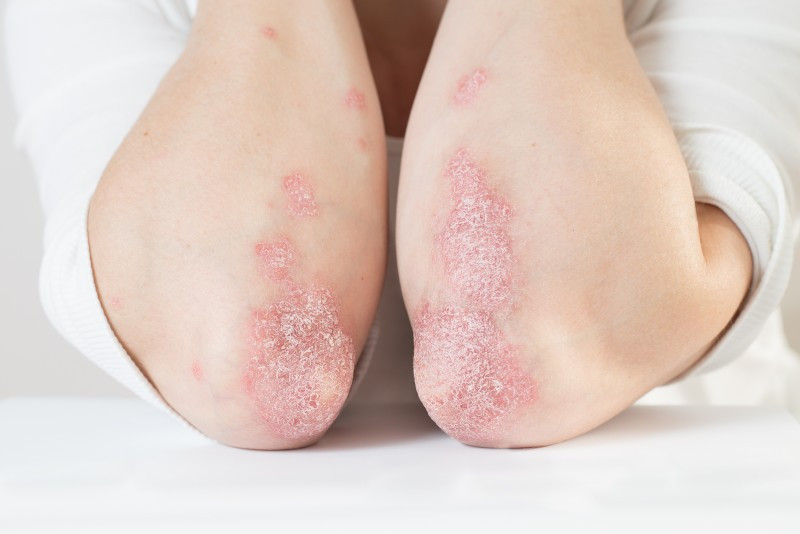August is Psoriasis Awareness/Action Month. Psoriasis is a chronic skin condition that can be painful, unsightly, and disruptive. Here is a brief look at this condition, and some dietary nutrients that, when taken in supplement form, can mitigate the symptoms of psoriasis.
What Is Psoriasis?
Psoriasis is a skin condition that is chronic, and it has no cure. It is the result of undue inflammation and skin cell production, resulting from immune dysfunction. There are various types of psoriasis, but plaque psoriasis is by far the most common type.
Excess skin cell production causes skin cells to build up before they can shed naturally, forming raised plaques and scales on the skin. This skin plaque can appear anywhere on the body, or it can be localized, often on the arms, knees, scalp, and torso. Some individuals with plaque psoriasis experience sensations of itching, burning, and stinging.
The causes of the immune dysfunction leading to plaque psoriasis are not fully understood. Scientists believe that it is usually the result of a combination of both genetics and environmental factors. The symptoms of psoriasis can come and go. Certain things can trigger symptoms, such as smoking, infections, dry weather, and injury to the skin. A variety of prescription medications and other treatments exist for plaque psoriasis. But treatment can also be found through use of the right herbs and supplements, and we'll get to that in a jiffy.
Supplements That Could Help Psoriasis
Certain dietary nutrients can combat plaque psoriasis. The nutrients listed here can each play a significant role in the body's response to the conditions that cause psoriasis symptoms. Talk to your healthcare provider before taking a dietary supplement for psoriasis.
Vitamin D is a critical vitamin, and supplementing with it could reduce the severity of plaque psoriasis symptoms. Vitamin D is crucial for regulating the immune system. Deficiency in vitamin D increases the risk of developing psoriasis, and it can easily increase symptoms in those who already have the condition. Oral vitamin D supplements are often recommended by dermatologists to slow skin cell growth and prevent itchy, flaky skin patches from forming.
Omega-3 fatty acids (EPA and DHA) found in fish oil supplements have the potential to reduce redness, itching, and skin plaque formation in those with psoriasis. This is because of their anti-inflammatory effect. The effect of Omega-3s on psoriasis has been corroborated by multiple studies. Some studies show their effect to be greatest when used alongside standard medical treatments for psoriasis, such as UV light therapy.
Vitamin E supplementation can be helpful for those with plaque psoriasis. Vitamin E reduces inflammation, and vitamin E deficiency is common in people with plaque psoriasis. Studies show that taking vitamin E can help reduce redness, itching, and inflammation from psoriasis.
Folic acid has been shown to have the potential to reduce the symptoms of psoriasis. This is because of its interactions with homocysteine, a protein which is often present in excess levels in the blood of those with psoriasis. Taking a folic acid supplement has the potential to help mitigate plaque psoriasis symptoms.
If you or a family member is suffering from plaque psoriasis, then your nutrient intake is likely an important factor in the persistence and severity of symptoms. Consider how the nutritional supplements above might be of help, and be sure to talk to your healthcare provider about them.

